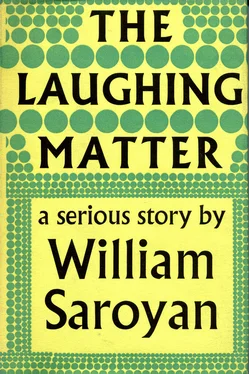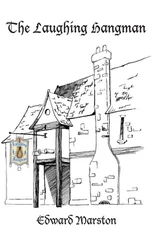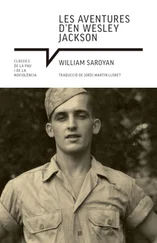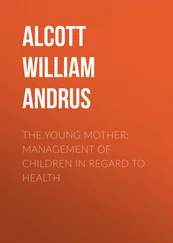He didn’t think it would do not to say something more to Red, but he was a little afraid to. He was a little afraid of everything now; of the car ahead, which he was sure he would be able to pass as easily as he’d passed all the others on the way, but he was a little afraid of it just the same. It was moving very slowly, and a driver of a slow car can suddenly do anything. He can suddenly make a left turn in front of a swiftly passing car. This one didn’t, though, and he passed it quickly. He saw an old man and his wife going along about twenty-five miles an hour in a car that was about twenty-five years old, on their way home after a visit with friends, most likely. He was a little afraid of the car that was moving toward him now, but the two cars drew abreast, made the swift sound cars moving in opposite directions make when they meet, and then all he had to be afraid of was Bart’s car. It was not a new car, the tires might not be what they ought to be. At seventy miles an hour a blowout might not be a simple thing to put up with.
He was a little afraid of the way Red had needed to speak about Milton Schweitzer, too.
“It’s not Milton Schweitzer,” he said at last.
“What, Papa?”
“I just said it was Milton Schweitzer because I didn’t want anybody to know who it is I’m really going to see.”
“Who is it?”
“Dade. My brother.”
“Why did you say Milton Schweitzer, then?”
“I didn’t want anybody to know I’m going to see my brother.”
“Why?” Red said. “Why didn’t you want anybody to know? Why are you driving so fast?”
He brought the car down to sixty, then fifty, then forty, and finally thirty. He did it because he needed to. He was a little too keyed up to be driving that fast. He was going too fast inside, too. He needed to go as slowly as possible.
“Red,” Evan said. “Listen to me a minute, will you?” (He’ll understand when I tell him this is something I can’t talk about. I know he will.) “Red,” he said. (No, he couldn’t. He’d better get himself straightened out. He’d better do it for his son, he’d better do it quick.) “Red,” he said. “Your father’s had a few to drink. You saw Warren Walz try to stand on his head. It was because he’d had a few to drink. It doesn’t mean anything. Everything’s fine. Nothing’s the matter. It’s just that when a man has a few to drink it seems as if something’s the matter with everything. Dade will be glad to see you.”
“Why did you say Milton Schweitzer?” Red said. “Why didn’t you say Dade?”
“I’ve had a few to drink,” Evan said, trying to speak cheerfully. “It’s nothing. You’re not scared any more, are you?”
“I don’t understand,” Red said. “Do you like Milton Schweitzer?”
“Of course I like Milton Schweitzer.”
“I hate him,” Red said.
“Why?” Evan said. (There’s no use performing for Red. There’s no use trying to pretend nothing’s the matter. He knows. I can’t protect him.)
“Do you remember when you asked if I liked Warren Walz?”
“Yes, Red. It was only yesterday.”
“And you asked why I liked Cody Bone?”
“Yes, Red.”
“And I said I just liked Cody Bone, but I didn’t know why. Well, I even like Warren Walz now. I liked him especially when he tried to stand on his head. But I don’t like Milton Schweitzer. I hate him.” He waited a moment, then said, “And I know why, too.”
“Why, Red?” He was past pretending cheerfulness. His voice was hushed.
“Mama said she was going to take Eva and me to the circus,” Red said. “We got ready. Then she called Mabel, and Mabel took us. We didn’t want to go with Mabel. I didn’t know why Mama changed her mind. I didn’t like the circus with Mabel.” He stopped.
“Why should you hate Milton Schweitzer because of that?” Evan said.
“Well, Papa, don’t you understand?” Red said. “When we got back from the circus he was visiting us.
“Then another time Mama promised to take us for a picnic to the campus. To that place where we had a picnic once, and so much fun. She made all the sandwiches and we were all ready to go, and then again she called Mabel, and Mabel took us to the picnic.”
“When was that?”
“When you went to make the money for the car,” Red said. “When are we going to get the car?”
“I don’t know,” Evan said. He was helpless now. He had to know. “When you got home after the picnic,” he said, “how was Mama?”
“All right, I guess,” Red said. “But I was mad at her. I was mad at him , too. I get mad sometimes, too. When I came into the house and saw him, I didn’t stop. I went straight through to the back yard, because I was so mad. I just said, ‘Why don’t you stay in your own house?’ And I went out into the back yard. Eva stayed in with Mama and him.”
“Why didn’t you tell me before, Red?”
“Why?” the boy said. “I don’t know. I forgot, I guess. He didn’t come to our house any more after that. Did you want me to tell you I talked that way? I felt ashamed. I didn’t want to talk that way. I just couldn’t help it.”
He drove into the airport parking lot and stopped the car.
“Your uncle Dade’s going to be glad to see you,” he said.
Dade looked tired. He looked so tired Red said to his father, “Is it Dade?” They went up to him, leaning against a counter, reading a book. He closed the book to look at the boy.
“Hello, Red,” he said. “You look fine. You look fine, boy.” He turned to his brother. “Do you know who he looks like? He looks like the old boy. Your grandfather, Red, Petrus Nazarenus. You look like him.” Dade looked at his brother again. “I thought even this would be better than nothing. I’ve got to take the plane back in an hour, though.”
Dade looked at the boy again, and this time smiled. He spoke in the language Red wished he could speak. The only word he said that Red understood was “Hey.” It was the first word of what Dade said. Hey, something or other in the unknown language, the words lively and hard and angry, but at the same time humorous, too.
Dade searched his brother’s eyes and very quietly said a few more words in the language. Red heard his father reply in the language.
They moved to a far bench and sat down. Dade sat close to Red, and put his arm around him. Red’s father sat on the other side of Red.
The brothers spoke in the language Red didn’t understand. He didn’t need to. He understood their voices. He understood Dade was Evan’s brother.
“Speak softly,” Dade said. “Speak softly, for your son, who is my own father.”
“I speak softly,” Evan said. “What do I do, brother?”
Dade spoke in English to Red. “You are my father, Petrus Nazarenus.” He turned the boy’s head toward him, and kissed him on the forehead. “If you get tired, if you want to walk around, if you want to look at the people, or go outside and look at the airplanes, we’ll be here, we’ll be seated here.”
Red turned and looked at his father. Evan saw the panic in his eyes again.
“I don’t want to go,” he said.
“I hoped you wouldn’t,” Dade said, “but I didn’t know.”
He spoke in the language again.
“We need a lifetime to understand the very simplest thing,” Dade said. “We need two lifetimes to correct a small error. We live an error every day and correct not one error in a lifetime. What do you do, my brother? Whatever you do, you yourself do nothing. Your doing is done for you. Whatever you do is right. If you hate, it is. If you kill, it is. Brother, if you love, it is right. If you love her who destroys you, it is right.” His tired eyes searched his brother’s. “Brother,” he said, “do what you must, do what you will, it is right.”
Читать дальше












